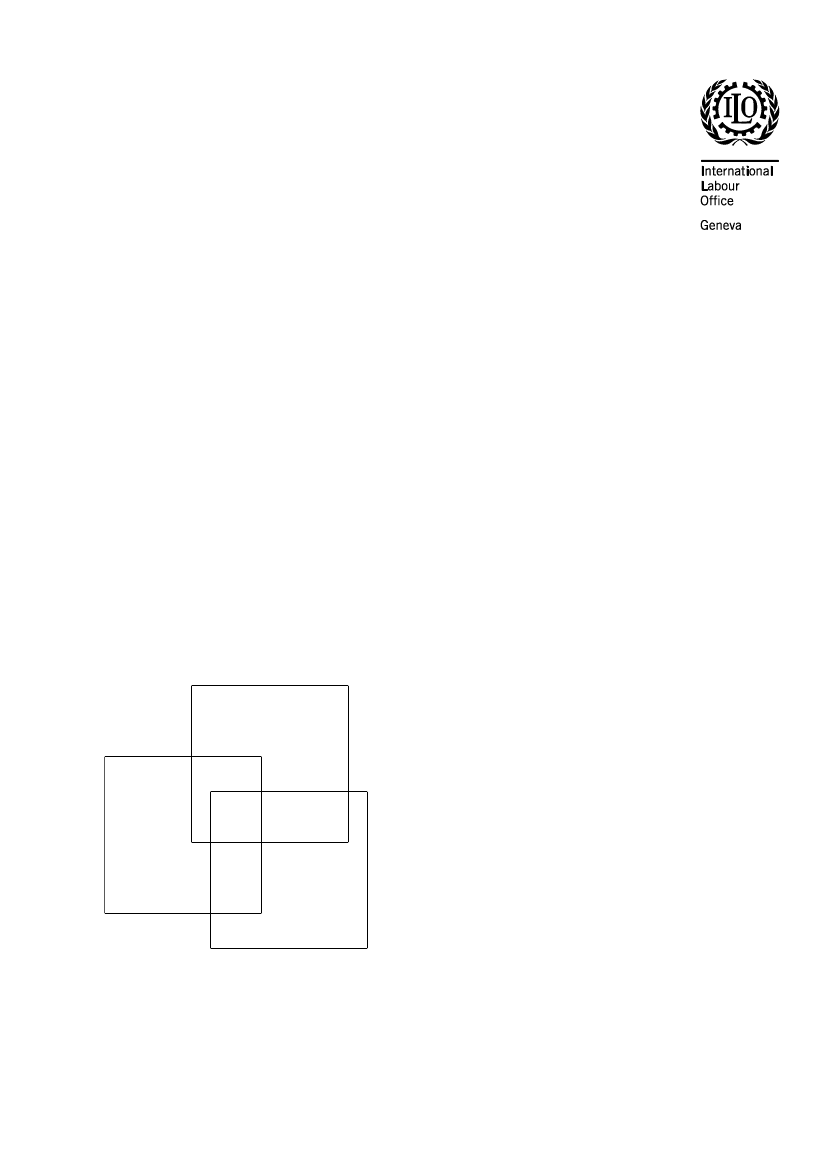Beskæftigelsesudvalget 2013-14
BEU Alm.del Bilag 233
Offentligt
103rd Session of theInternational Labour ConferenceAdvance informationBuilding a future with decent work
Palais des Nations and ILO headquartersGeneva, 28 May–12 June 2014
ContentsPage
Introduction to the Conference ........................................................................................................Proposed Conference programme ....................................................................................................Agenda of the 103rd Session of the International Labour Conference ............................................Election of the Governing Body of the ILO for 2014–17 ...................................................................Overview of the agenda of the Conference ......................................................................................Plenary...............................................................................................................................................Committees .......................................................................................................................................Participation ......................................................................................................................................Speaking in plenary ...........................................................................................................................Advance registration in committees .................................................................................................Practical arrangements .....................................................................................................................Rules of procedure of the Conference ..............................................................................................Contact details...................................................................................................................................
112344491111121415
ILC103-advance-info-[RELOF-140109-1]-En.docx
iii
Introduction to the ConferenceThe International Labour Conference is the ILO’s highest decision-making body. Itmeets annually in June, bringing together the tripartite delegations from theOrganization’s 185 member States. The Conference is composed of a plenary and oftechnical committees. The plenary sits in the Assembly Hall of thePalais des Nations.Naturally, the Conference opens and closes in plenary sitting. During intermediateplenary sittings, all delegates may participate in the discussion of the Reports of theChairperson of the Governing Body and of the Director-General. The plenary alsoperforms administrative and formal tasks for the Conference and may hold sittings toreceive distinguished guests, including Heads of State or Government.The Conference usually establishes committees to deal with the technical items onits agenda, which this year means items III, IV, V and VI, of which details are given below.These committees thus meet concurrently, and work through the first and second weeksof the Conference, before finalizing their reports, conclusions or any instruments theymay have drafted, which are then returned to the plenary for adoption.As ILO member States are aware, the Governing Body of the ILO is currentlyreviewing the functioning of the Conference and reforming it. Certain decisions whichmay affect the 103rd Session of the Conference will be taken at the 320th Session of theGoverning Body, to be held from 13 to 27 March 2014. This document therefore includesgeneral and advance information on the Conference that is correct at the time of printing.A Conference guide containing further and updated details will be published after theMarch Governing Body session.
Proposed Conference programmeTuesday, 27 May: Group meetingsIn order to allow the technical committees to begin their substantive work on thefirst day of the Conference, group meetings will be held onthe day before the officialopening sitting.In addition to the meetings of the full Government, Employers’ andWorkers’ groups, where the groups elect their Officers, make proposals relating to thecomposition of the different committees, and become acquainted with Conferenceprocedure, provision will also be made for planning meetings for the groups in each ofthe technical committees, to be held as deemed appropriate by each group.Themembers of tripartite national delegations should therefore arrive in Geneva insufficient time to be able to take part in these meetings.
Wednesday, 28 May: Opening sittingThe opening sitting will take place in the Assembly Hall of thePalais des Nationsinthe morning. At the opening sitting, delegations will be called on to elect the Officers ofthe Conference, set up the various committees and take other decisions as needed. TheSelection Committee (see page 8) will meet immediately after the opening sitting of theConference to take decisions concerning arrangements for the Conference.
ILC103-advance-info-[RELOF-140109-1]-En.docx
1
Wednesday, 28 May–Saturday, 7 June:Work of the CommitteesCommittees begin their work on the opening day of the Conference and continueuntil Saturday, 7 June. This means that committee meetings and the general discussion inplenary will overlap by four days.
Wednesday, 4–Thursday, 12 June: Plenary sittings –Discussion of the Reports of the Chairperson ofthe Governing Body and of the Director-GeneralThe plenary of the Conference will sit, morning and afternoon, to discuss the Reportsof the Chairperson of the Governing Body and of the Director-General. The World ofWork Summit will also take place during these dates, as will the adoption of reports andresolutions and voting to adopt international labour Conventions and Recommendationsprepared by the technical committees. Please note that a plenary sitting of theConference may be called at any other time, if necessary.
Thursday, 12 June: Closing ceremonyThe closing ceremony will take place in the Assembly Hall of thePalais des Nations.
Agenda of the 103rd Session of theInternational Labour ConferenceStanding itemsI.II.III.Reports of the Chairperson of the Governing Body and of the Director-GeneralProgramme and budget and other financial questionsInformation and reports on the application of Conventions and Recommendations
Items placed on the agenda by the Conference or the Governing BodyIV. Supplementing the Forced Labour Convention, 1930 (No. 29), to addressimplementation gaps to advance prevention, protection and compensationmeasures, to effectively achieve the elimination of forced labour –Standard setting,single discussion1
1
Under the single discussion procedure, the Conference may adopt an international labourstandard at a single session (i.e. in a single year).
2
ILC103-advance-info-[RELOF-140109-1]-En.docx
V.
Facilitating transitions from the informal to the formal economy –Standard setting,double discussion2
VI. A recurrent discussion on the strategic objective of employment
Election of the Governing Body of the ILOfor 2014–17Election of members of the Governing BodyArticle 7(5) of the Constitution of the ILO stipulates that the Governing Body’s periodof office is three years. As the last elections were held during the 100th Session (2011),elections will be held at the 103rd Session to select the Governments represented in, andthe Employer and Worker members of, the Governing Body. The date at which theelectoral colleges will meet for this purpose has beententativelyscheduled for theafternoon of Monday, 2 June.Article 52 of the Standing Orders of the Conference sets out the voting procedure.Some brief details on the composition of the Governing Body and its electoral procedurefollow.
Composition of the Governing BodyThe composition of the Governing Body is regulated by article 7 of the Constitutionof the ILO and section G of the Standing Orders of the Conference. It consists of56 Governments (28 regular members and 28 deputy members), 33 Employer members(14 regular members and 19 deputy members), and 33 Worker members (14 regularmembers and 19 deputy members). Voting for membership takes place in the threegroups’ electoral colleges, explained below.
Electoral collegesThe Government electoral college, as set out in article 49 of the Standing Orders ofthe Conference, is composed of the Government delegates of all Members of theOrganization, except those from the ten Members of chief industrial importance3(whichhold non-elective seats), and from governments that have lost the right to vote. Ittherefore elects 18 regular and 28 deputy Government members on the basis ofgeographical distribution.The Employers’ and Workers’ electoral colleges consist of the Employers’ andWorkers’ delegates to the Conference, respectively, excluding delegates of States thathave lost the right to vote. They elect, by name, 14 persons as regular members and 19 asdeputy members of the Governing Body (ILC Standing Orders, article 50).
2
Under the double discussion procedure, the Conference may adopt an international labourstandard over two sessions (i.e. over two years).3
Brazil, China, France, Germany, India, Italy, Japan, Russian Federation, United Kingdom andUnited States.
ILC103-advance-info-[RELOF-140109-1]-En.docx
3
Overview of the agenda of the ConferencePlenaryI.Reports of the Chairperson of the Governing Bodyand the Director-GeneralThe Director-General of the International Labour Office will present his Report to theConference during the opening sitting. It will be accompanied by anAppendix on thesituation of workers of the occupied Arab territories.The Chairperson of the GoverningBody will submit a report to the Conference on the work carried out by the GoverningBody from June 2013 to June 2014.
CommitteesII.Finance Committee of Government Representatives(ILC Standing Orders, article 7bis and section H, article 55(3))Under agenda item II, the Conference will be called on to consider and adopt thefinancial statements for the year ended 31 December 2013 and to consider such otherfinancial and administrative matters as the Governing Body may decide to bring to itsattention.
III.
Information and reports on the applicationof Conventions and Recommendations(ILC Standing Orders, article 7 and section H)The Committee on the Application of Conventions and Recommendations is set upto deal with this item. It submits a report on its work to the Conference.The Committee on the Application of Conventions and Recommendations willconsider information and reports supplied by governments under articles 19, 22 and 35 ofthe Constitution on the effect given to Conventions and Recommendations, together withtheReport of the Committee of Experts on the Application of Conventions andRecommendations.This report consists of two volumes, both submitted to theConference. A first volume (ILC.103/III/1A) includes, in particular, the observations on theapplication of ratified Conventions. The second volume (ILC.103/III/1B) contains theGeneral Survey of reports under articles 19 and 22. The General Survey submitted to thissession will deal with the following Convention and Recommendation: the MinimumWage Fixing Convention, 1970 (No. 131), and the Minimum Wage FixingRecommendation, 1970 (No. 135). This General Survey and its discussion by theCommittee on the Application of Conventions and Recommendations will contribute tothe recurrent discussion on the strategic objective of social protection (labour protection)placed by the Governing Body on the agenda of the 104th Session (2015) of theConference, under the follow-up to the 2008 ILO Declaration on Social Justice for a FairGlobalization.
4
ILC103-advance-info-[RELOF-140109-1]-En.docx
IV.
Supplementing the Forced Labour Convention, 1930 (No. 29),to address implementation gaps to advance prevention,protection and compensation measures, to effectivelyachieve the elimination of forced labour –Standard setting, single discussionAccording to the most recent ILO estimates, at least 20.9 million people are victimsof forced labour globally. The conclusions adopted by the Tripartite Meeting of Experts onForced Labour and Trafficking for Labour Exploitation (11–15 February 2013) consideredthat despite the broad reach of Convention No. 29, and the measures taken by memberStates, there was “an added value in the adoption of supplementary measures to addressthe significant implementation gaps remaining in order to effectively eradicate forcedlabour in all its forms” (paragraph 26). The experts reached consensus that these gaps“should be addressed through standard setting to advance prevention, protection andcompensation measures” (paragraph 27).At its 317th Session (March 2013), the Governing Body decided to place a standard-setting item on the agenda of the 103rd Session (2014) of the Conference with a view tosupplementing Convention No. 29, to address implementation gaps to advanceprevention, protection and compensation measures, to effectively achieve theelimination of forced labour. The Governing Body also approved a programme of reducedintervals for this item, to allow the Conference to deal with it at this session.Accordingly, the Conference will consider the possible adoption of an instrument, orinstruments, under the single discussion procedure foreseen in article 38 of the StandingOrders of the Conference. The Office has prepared two reports as a basis for this item.The first (summary) report,Strengthening action to end forced labour(ILC.103/IV/1), sentout to all member States in August 2013, contains a statement of law and practice withregard to the elimination of forced labour in member States. It also contains aquestionnaire to which governments were invited to give their views, in consultation withthe most representative organizations of employers and workers. The second (final)report, to be despatched in March 2014, consists of two volumes: Conferencereport IV(2A) (ILC.103/IV/2A) includes summaries of replies received from governments,employers’ and workers’ organizations, and the Office commentary; and Conferencereport IV(2B) (ILC.103/IV/2B) contains the draft text of the proposed Protocol andRecommendation to be submitted for discussion.
V.
Facilitating transitions from the informal to the formal economy –Standard setting, double discussionThe informal economy is significantly impacting the world of work, with as much as40–80 per cent of the labour force in developing countries working within it. Increasingly,transition to formality has emerged as a priority policy agenda in developed anddeveloping countries, and new policy initiatives and approaches are taken in differentregions that facilitate this transition through multiple pathways.At its 317th Session (March 2013) the Governing Body decided to place a standard-setting item on the agenda of the 103rd Session (June 2014) of the Conference onfacilitating transitions from the informal to the formal economy, under the double
ILC103-advance-info-[RELOF-140109-1]-En.docx
5
discussion procedure, which means that this item will be dealt with at the current sessionand at the 104th Session of the Conference (2015).This standard-setting item builds on the conclusions concerning decent work and theinformal economy, adopted by the Conference in 2002, the outcome of the ILO TripartiteInterregional Symposium on the Informal Economy (2007) and the 2012 Conferenceconclusions concerning the recurrent discussion on fundamental principles and rights atwork, which called for the convening of a meeting of experts on advancing fundamentalprinciples and rights at work in the informal economy.At its 317th Session, the Governing Body decided to convene a Tripartite Meeting ofExperts on Facilitating Transitions from the Informal Economy to the Formal Economy, toprovide guidance on the nature and content of the proposed instrument, in particularconcerning innovative solutions and up-to-date experience (legal, policy, institutional,governance and other interventions) which have proved successful in supporting thetransition from informality to formality. The Tripartite Meeting of Experts took place inGeneva from 16 to 20 September 2013. Its report, including the Chairperson’s summary,was submitted to the 319th Session of the Governing Body as a Supplementary Report ofthe Director-General (GB.319/INS/14/6).The law and practice report prepared by the Office,Transitioning from the informalto the formal economy(ILC.103/V/1), sent out to all member States in August 2013,provides an overview of the informal economy, its impact on the attainment of decentwork for all workers and employers and the ILO’s approach to the transition to formality,as set out in the 2002 conclusions. It covers the regulatory environment relating to theinformal economy at national and international levels, with examples of existing laws andpractice from different regions, legal systems, traditions and circumstances adopted byILO constituents to move progressively to the formal economy. Finally, it examines theneed for an integrated policy framework, encompassing the ILO’s four strategic objectives(fundamental principles and rights at work, employment, social protection and socialdialogue) adapted to the national context of each member State for a progressivetransition to the formal economy and decent work. The report is accompanied by aquestionnaire, as provided for in article 39 of the Standing Orders of the Conference,which has been drawn up with a view to preparing a Recommendation on facilitatingtransitions from the informal to the formal economy.The second report (ILC.103/V/2), to be sent to member States in April 2014, is basedon the replies received to the questionnaire, summarized and commented on in thereport. It contains a set of proposed draft conclusions, prepared on the basis of thesereplies, which are intended to serve as a basis for discussion by the Conference duringthis session.
VI.
A recurrent discussion on the strategic objective of employmentAt its 97th Session (2008), the Conference adopted the ILO Declaration on SocialJustice for a Fair Globalization, calling all Members of the Organization to pursue policiesbased on the strategic objectives – employment, social protection, social dialogue, andfundamental principles and rights at work. The follow-up to the Declaration introduced ascheme of recurrent discussions by the International Labour Conference, covering each ofthe four strategic objectives in turn, in order to “understand better the diverse realitiesand needs of [ILO] Members with respect to each of the strategic objectives, respondmore effectively to them, using all the means of action at [the ILO’s] disposal, including
6
ILC103-advance-info-[RELOF-140109-1]-En.docx
standards-related action, technical cooperation, and the technical and research capacityof the Office, and adjust its priorities and programmes of action accordingly” (Part II(B)(i)).The discussion on the strategic objective of employment in 2010 inaugurated the firstseven-year cycle of recurrent discussions. A first round of all four strategic objectivesconcluded in 2013; a second discussion of the strategic objective of employment is due totake place in 2014.Consequently the report, entitledEmployment policies for sustainable recovery anddevelopment(ILC.103/VI), prepared by the Office in line with the guidance provided atthe 317th Session (March 2013) of the Governing Body, which will be sent out to memberStates in early 2014, analyses current employment challenges in diverse regional andnational contexts and their implications for effective responses and employment policy. Itdiscusses the impact of the continuing economic and financial crisis, and weak anduneven recovery, on employment and labour markets in different regions and fordifferent groups, especially young people and women. It examines policy responses to thecrisis and their effectiveness beyond the crisis, analysing six global and structural trendsand drivers of change that carry profound implications for employment policy:globalization and technological transition; income inequality; climate change, the newdemographic context; skills mismatches; and gender gaps.The report also provides a succinct review of action by the Organization and itsMembers to promote employment. It presents measures taken by the Office toimplement the 2010 recurrent discussion conclusions, placing emphasis on theinseparable, interrelated and mutually supportive nature of the four strategic objectivesof the ILO.In its approach to the challenging and evolving environment, the report takesaccount of the new priorities introduced by the ILO’s internal reform, reviewing possibleways to address the employment challenges faced by ILO constituents in specificcontexts. It contains a set of suggested points for discussion.
Amendments to the Maritime Labour Convention, 2006The Maritime Labour Convention, 2006 (MLC, 2006), entered into force on20 August 2013. On 9 September 2013 the Director-General received two sets ofproposals for amendments to the Code of the Convention (the Standards in Part A of theCode and the Guidelines in Part B of the Code, including their appendices). Theseproposals cover, respectively, the issue of abandonment of seafarers and therequirement, already stipulated in the MLC, 2006, that shipowners provide financialsecurity for compensation in the event of death or long-term disability of a seafarer dueto occupational injury, illness or hazard.These proposals for amendments were submitted jointly by the Shipowners’ andSeafarers’ groups on the Special Tripartite Committee (the MLC Committee). TheCommittee, which is provided for under Article XIII of the MLC, 2006, was established bythe Governing Body in June 2013. It has several important functions under the MLC, 2006,including, under Article XV, a central role with respect to the simplified process foramendment of the Code of the Convention. In accordance with that Article, theDirector-General communicated the proposals for amendments to all Members, with aninvitation to submit comments or suggestions on them by 17 March 2014. The MLCCommittee will meet from 7 to 11 April 2014 and will consider the proposals foramendments. If it adopts amendments, these must, under Article XV(5) of the Convention,
ILC103-advance-info-[RELOF-140109-1]-En.docx
7
be submitted for approval by the next session of the International Labour Conference. TheGoverning Body, at its 320th Session (March 2014), will consider provisionally placing anyamendments that may be adopted by the MLC Committee on the agenda of the103rd Session of the Conference.On the assumption that the proposed amendments will be adopted, the Conferencewill need to decide how they should be discussed. Under Article XV(5) of the MLC, 2006,this decision is limited to approving the amendments, or referring them back to the MLCCommittee for further consideration, thus taking up a minimum of Conference time. It istherefore expected that this question will be put to a vote in plenary. Approval requires amajority of two-thirds of the votes cast of delegates present at the Conference.Further information on this matter will be communicated to Members in due course.
Selection Committee(ILC Standing Orders, article 4 and section H, article 55(2))The Selection Committee is composed of 28 members appointed by the Governmentgroup, 14 members appointed by the Employers’ group, and 14 by the Workers’ group. Itsresponsibilities include arranging the programme of the Conference, fixing the time andagenda of its plenary sittings and acting on its behalf on any other routine question. Sincethe 1996 reforms to the Conference, most of these tasks have been delegated to theOfficers of the Committee. The Selection Committee may be called on at any time toconsider specific issues.
Credentials Committee(ILC Standing Orders, article 5 and section B)The Credentials Committee is composed of one Government, one Employers’ andone Workers’ delegate, appointed by the Conference. It meets in closed sittings.Its responsibilities include:■
examining the credentials, as well as any objection relating to the credentials, ofdelegates and their advisers, or relating to the failure to deposit credentials of anEmployers’ or Workers’ delegate (ILC Standing Orders, articles 5(2) and 26bis);considering complaints of non-observance of article 13(2)(a), of the Constitution(payment of expenses of tripartite delegations) or concerning delegates or advisersprevented from attending the Conference (ILC Standing Orders, articles 5(2) and26ter);monitoring of any situation with regard to the observance of the provisions ofarticle 3 or article 13(2)(a) of the Constitution, about which the Conference hasrequested a report (ILC Standing Orders, articles 5(2) and 26quater); anddetermining the quorum required for the validity of votes taken by the Conference(ILC Standing Orders, article 20(1)).
■
■
■
8
ILC103-advance-info-[RELOF-140109-1]-En.docx
ParticipationComposition of delegationsMember States’ delegations to the International Labour Conference are composedoffourdelegates:twoGovernment delegates,onedelegate representing the Employersandonedelegate representing the Workers (Constitution, article 3(1)).Each delegate may be accompanied by advisers, who shall not exceed two for eachtechnical item on the Conference agenda (Constitution, article 3(2)).At the103rd Session, there are presently four such items on the agenda, items III, IV, V and VI,therefore, each Government, Employers’ and Workers’ delegate to the 103rd Session ofthe International Labour Conference may be accompanied by up to eight advisers.Inorder to allow for a full and equal participation of Government, Employer and Workerrepresentatives, in line with the principles of tripartism, the number of advisersaccompanying each of the delegates should be balanced.Travel and living expenses ofdelegates and their advisers are to be borne by their respective States(Constitution,article 13(2)(a)).Under the Constitution, member States shall ensure that their delegations are fullytripartite and that they remain so throughout the duration of the Conference, inparticular for the purpose of voting, which takes place on the last days of the session.Delegates must be able to act in full independence of one another. The non-governmentdelegates must be chosen in agreement with the most representative organizations ofemployers and workers, respectively, in their respective countries, if such organizationsexist (Constitution, article 3(5)).Constituents are asked to remember that the success of the discussions dependson the competencies of participants.It is therefore of critical importance thatparticipants should be chosen not only for the technical expertise required, but also witha view to adopting a coordinated approach, involving action shared between differentgovernment administrations.
Gender parityGovernments and employers’ and workers’ organizations are asked to bear in mindthe resolutions addressing the participation of women in ILO meetings, adopted by theInternational Labour Conference at its 67th (1981), 78th (1991) and 98th (2009) Sessions.As the proportion of women among delegates and advisers remains low, the GoverningBody of the ILO discussed this issue at its 316th Session (November 2012) and decided,among other measures, to request the Director-General to send letters after everyConference to Members which had not reached a 30 per cent level of participation ofwomen in International Labour Conference delegations, and to report periodically to theGoverning Body on any obstacles encountered, as well as any measures taken to achievegender parity.Such letters were sent out to the member States concerned following the lastsession of the International Labour Conference (2013). Governments and employers’ andworkers’ organizations are strongly urged to include a higher percentage of women intheir delegations to the Conference, with a view to achieving gender parity in delegations.
ILC103-advance-info-[RELOF-140109-1]-En.docx
9
CredentialsCredentials of delegates and their advisers must be deposited with the InternationalLabour Officeat least 15 daysbefore the date fixed for the opening sitting, in line witharticle 26(1) of the Standing Orders of the Conference. The time limit for the deposit ofthe credentials of all delegates and advisers is thereforeMonday, 12 May 2014.The form for the submission of credentials, attached to the letter of convocation andalso available on the ILO website, is accompanied by an Explanatory note for nationaldelegations on the deposit of credentials, giving details on the various categories ofparticipants at the Conference, and the roles that they play. Contact details are givenboth in the Explanatory note and in the table at the end of this document.This form will also be available online.Access codes will be sent to permanentmissions of member States in Geneva in early 2014. The codes allow the form to becompleted online and submitted through the Organization’s website. The electronicsubmission is validated by sending a printed copy of the form signed by the authorizedrepresentative of the government to the International Labour Office. The use of theonline credentials form is strongly encouraged as it speeds up the processing of thecredentials and reduces the risk of clerical errors in the transcription of the credentials.
Representation of non-metropolitan territoriesRequests for invitations of non-metropolitan territories must reach the Office byWednesday, 26 February 2014to be submitted to the Governing Body for approval by itsInstitutional Section at the 320th Session (March 2014).Under article 3(3) of the Constitution:Each Member which is responsible for the international relations of non-metropolitanterritories may appoint as additional advisers to each of its delegates:(a)(b)persons nominated by it as representatives of any such territory in regard to matterswithin the self-governing powers of that territory; andpersons nominated by it to advise its delegates in regard to matters concerning non-self-governing territories.
Alternatively, in accordance with a Governing Body decision of 1954, in line with theconstitutional, political, economic and social development of any non-metropolitanterritory for which a member State is responsible, the non-metropolitan territory inquestion may be invited, through the member State concerned, to participate by meansof a tripartite observer delegation in sessions of the Conference, with the rights andstatus accorded to observers under the Standing Orders of the Conference.
Representation of international non-governmental organizationsFor information on participation at the International Labour Conference byinternational non-governmental organizations, please visit the ILO web page on engagingcivil society at: www.ilo.org/pardev/civil-society/lang--en/index.htm, which gives fullinformation on the conditions to be met.
10
ILC103-advance-info-[RELOF-140109-1]-En.docx
The deadline for applications by international non-governmental organizations to berepresented at the 103rd Session of the Conference isThursday, 13 February 2014.
Speaking in plenaryDelegates are reminded that, in order to have the right to speak in plenary, theymust be accredited either as regular delegates or as “advisers and substitute delegates”,acting on behalf of regular delegates. Delegates accredited as “advisers” are normally notentitled to speak in the plenary. Please refer to the Explanatory note on credentials fornational delegations.Delegates wishing to speak in plenary are encouraged to register in advance, as fromTuesday, 1 April 2014,by email, fax or telephone (see section – Contact details). Theymay also do so during the Conference, as early as possible, at the registration of speakersoffice. The list of speakers closes onWednesday, 4 June, at 6 p.m.,subject to the decisionof the Selection Committee. Please note that this concerns registration only for thosewishing to take the floor in plenary in the discussion of the Reports of the Chairperson ofthe Governing Body and of the Director-General.
Advance registration in committeesThe membership of the technical committees set up to deal with agenda items III, IV,V and VI is determined by the groups, subject to approval by the Conference of the initialcomposition of these committees. Delegates wishing to be a member of a committeemust therefore register with their respective group.This year, in order to facilitate the work of the Conference and group secretariats,delegates who intend to participate in committees are asked to complete registrationforms in advance and send them to the International Labour Office. The registrationforms will be made available for download on the ILO website in the course of the monthof February 2014, and will be sent to Members along with the Conference guide, after theMarch Governing Body session.The completed forms should be sent to the following ILO departments (contactdetails at the end of this document):Governments:Employers:Workers:Official Relations and Meetings Branch (RELOFF)Bureau for Employers’ Activities (ACT/EMP)Bureau for Workers’ Activities (ACTRAV)
Please note that committee membership will be effective only once:■
the Office has received official credentials from the government accrediting theperson concerned as regular delegate, adviser, or person designated in accordancewith article 2(3)(i) of the Standing Orders of the Conference; andthe registration request is endorsed by the group concerned and the initialcommittee composition approved by the Conference.
■
ILC103-advance-info-[RELOF-140109-1]-En.docx
11
Practical arrangementsDelegates with disabilitiesThe Conference premises are generally accessible to persons with disabilities. Forfurther information please contact the RELOFF Meetings Management Unit (email:[email protected]; telephone: +41 22 799 6767).
Accommodation for delegations in GenevaJune is a busy month in Geneva so delegations are encouraged to make reservationswell in advance. The International Labour Office does not have a hotel reservationservice, therefore delegations to the Conference should request their permanentdiplomatic missions in Geneva, or where applicable, in Bern, to make the necessaryreservations with hotels in the Geneva area. Reservations may also be made through the:Delegates Welcome ServiceCentre d’Accueil – Genève Internationale (CAGI)La Pastorale – 106, route de FerneyCH-1202 GenèveTelephone: +41 22 546 23 00Email: [email protected]Website: www.cagi.ch
Office du tourisme de Genève18, rue du Mont BlancCase postale 1602CH-1211 Genève 1Telephone: +41 22 909 70 00Fax: +41 22 909 70 11Website: www.geneve-tourisme.ch/en/home/
Entry visas for Switzerland (and France)Nationals of many ILO member States require visas to enter and remain inSwitzerland for the period of the Conference. Please note that Switzerland applies theEuropean Schengen regulationsconcerning the issuance of visas.Entry visas for Switzerlandare issued primarily by Swiss diplomatic representationsabroad. Delegates to the Conference who require an entry visa should submit a request,well in advance, to the Swiss embassy or consulate in their country of residence.However, certain countries do not have a Swiss consulate/embassy, in which case the visarequest might have to be made in another country where the competent representationis located. Switzerland has signed agreements with certain countries where it is notrepresented by a diplomatic or consular entity. Under certain conditions theseagreements allow for the issuing of visas by a Schengen State in a country whereSwitzerland is not represented.
12
ILC103-advance-info-[RELOF-140109-1]-En.docx
Additional information may be found at the followingwww.bfm.admin.ch//content/bfm/en/home/themen/einreise.html.
web
address:
The Schengen visa issued will be valid for entering the territory of all Statesbelonging to the Schengen area. Likewise, persons already holding Schengen visas issuedby other Schengen States will be permitted to enter Switzerland.The governments of member States are solely responsible for ensuring that alldelegates included in their delegation’s official credentials obtain necessary entry visasfor Switzerland.Please keep the following in mind:■
The time for processing visa requestsmay vary from case to case. Delegations arestrongly encouraged to communicate their credentials to the Office as early aspossible and to take the necessary steps for visa application well in advance (butatthe earliest three months before the departure date),so that the visa can be issuedin a timely manner.On 11 October 2011 the Schengen member States introduced the Visa InformationSystem (VIS) which is used to store biometric data (ten fingerprints and facial image)of the Schengen visa applicant. All Swiss embassies and consulates are graduallybeing connected to the VIS system. It is necessary for the visa applicant to make anappointment with the Swiss embassy/consulate in his/her country of residence andpresent him/herself in person to submit and register his/her biometric data. Thisdata remains valid in the VIS system for a period of five years. A document in severallanguages explaining the implementation of the VIS system, registration of biometricdata and the rollout timetable for Swiss embassies/consulates connected to the VISsystem is available at the following web address: www.bfm.admin.ch//content/bfm/en/home/themen/einreise/einfuehrung_vis.html.The following documents must be submitted by each member of the delegation:–
■
■
a travel document, the validity of which exceeds that of the stay, and coversthe period necessary for the return journey;a visa application form, together with two photos;supporting documents concerning the purpose of the journey, for example, anote verbalefrom the Government duly initialled together with anauthorization to undertake the mission, a copy of credentials, an invitation tothe Conference, etc.any other document that the representation considers necessary.
––
–■
Except for holders of diplomatic or service passports, the Swiss authorities mayrequire that member States provide proof of adequate travel insurance.
Office interventionThe International Labour Office can only intervene with Swiss authorities if avisarequest is not grantedby them. Such interventions can be made only on behalf of thefollowing categories of participants: delegates, advisers, and persons designated in
ILC103-advance-info-[RELOF-140109-1]-En.docx
13
accordance with article 2(3)(i) of the Standing Orders of the Conference. For all otherparticipants (“other persons attending the Conference” and “support staff fordelegations”), member States should contact the Swiss representation in their countrydirectly and arrange their visas without any ILO involvement. Please note that for theOffice to intervene with Swiss diplomatic representations on behalf of the categories ofparticipants listed above, their credentials must have been received in GenevabyMonday, 12 May 2014.The following conditions must be met:■
the first and last names of the person concerned must be included in the officialcredentials of the delegation within one of the above categories of participants, assubmitted to the International Labour Office by the Government;the visa application must have already been processed by a Swiss diplomaticrepresentation;the request for intervention must reach the Officeat least a week before thedeparture date,indicating the Swiss representation to which the visa application isbeing made.
■
■
Meeting room reservationsParticipants wishing to reserve rooms for the purpose of bilateral, multilateral orgroup meetings on matters related to ILC business may do so in advance by email, as ofTuesday, 15 April 2014,to the following address: [email protected].
Rules of procedure of the ConferenceThe rules of procedure of the Conference are contained in the Constitution of theInternational Labour Organisation and in the Standing Orders of the Conference.These texts can be consulted on the ILO website: www.ilo.org/ilc. They may also beobtained in Geneva at the document distribution service.The submission of draft resolutions on items which are not included on theConference agenda will be addressed at the 103rd Session of the Conference inaccordance with articles 15 and 17 of the Standing Orders of the Conference, unless theConference determines otherwise in conformity with article 76.
14
ILC103-advance-info-[RELOF-140109-1]-En.docx
Contact detailsILO website: www.ilo.org/ilcInternational Labour Office, Route des Morillons 4, CH-1211 Geneva 22, SwitzerlandDepartmentOfficial Relations and Meetings BranchCredentialsBy post to:Office of the Legal AdviserILOCH-1211 Geneva 22Registration of speakersMeeting room reservationsDocumentation+41 22 799 80 40Telephone+41 22 799 77 32+41 22 799 65 69Email[email protected][email protected]Fax+41 22 799 89 44+41 22 799 84 70
+41 22 799 74 76+41 22 799 65 02
+41 22 799 89 44
+41 22 799 63 61
ILC103-advance-info-[RELOF-140109-1]-En.docx
15



















